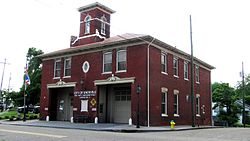Mechanicsville Historic District | |
 Fire Station No. 5 in Mechanicsville | |
| Location | Includes portions of University, Middle, Boyd, Arthur, McGhee, Clark, Oak, Deaderick, Tulip, Hannah, Western, and College Knoxville, Tennessee |
|---|---|
| Coordinates | 35°58′07″N 83°56′02″W / 35.96861°N 83.93389°W |
| Area | approximately 31 acres (13 ha)[1] |
| Built | 1880–1920 |
| Architect | multiple |
| Architectural style | Queen Anne, Italianate, Victorian commercial, Gothic Revival, Shotgun |
| NRHP reference No. | 80003842 |
| Added to NRHP | July 18, 1980 |
Mechanicsville is a neighborhood in Knoxville, Tennessee, United States, located northwest of the city's downtown area. One of the city's oldest neighborhoods, Mechanicsville was established in the late 1860s for skilled laborers working in the many factories that sprang up along Knoxville's periphery. The neighborhood still contains a significant number of late-19th-century Victorian homes, and a notable concentration of early-20th-century shotgun houses. In 1980, several dozen properties in Mechanicsville were added to the National Register of Historic Places as the Mechanicsville Historic District.[1] The neighborhood was also designated as a local historic district in 1991, subject to historic zoning and design standards.[2]
Post-Civil War railroad construction lured heavy industry to the Second Creek valley, starting with the Knoxville Iron Company, which built a massive foundry just southeast of Mechanicsville in 1868. In the 19th century, when the neighborhood acquired its name, the word "mechanic" typically referred to factory workers.[3] Mechanicsville was developed during this period to provide housing for Welsh iron specialists and African-American laborers working at Knoxville Iron and other area factories. By the 1880s, Mechanicsville was surrounded by large factories and mills, and contained most of Knoxville's railroad maintenance shops.[4]
In the early twentieth century, Mechanicsville developed into a primarily African-American neighborhood, and was home to the historically black Knoxville College and Knoxville Medical College, and several early black entrepreneurs and professors.[1]
- ^ a b c Nissa Dahlin Brown, National Register of Historic Places Nomination Form for Mechanicsville Historic District, 4 March 1980.
- ^ "Mechanicsville Historic District Design Guidelines" (PDF). Knoxville-Knox County Historic Zoning Commission and Metropolitan Planning Commission. 2011.
- ^ Jack Neely, "While Away a Sunny Afternoon in One of Knoxville's Most Historic Neighborhoods."Metro Pulse, 27 May 2008.
- ^ Cite error: The named reference
deaderickwas invoked but never defined (see the help page).

